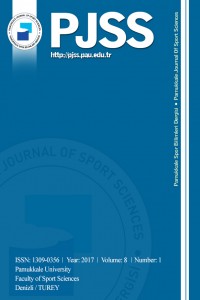The effects of feedback on the physical education majors’ acquisition of cardiopulmonary resuscitation skills
Abstract
Aim: To examine the effects of knowledge of results on CPR skill acquisition in undergraduate students. Subjects: Participants included fifty-one undergraduate physical education majors enrolled in the Healthcare Knowledge and First Aid course. Method: After receiving conventional four-hour CPR training, the participants completed a pre-test on CPR skill execution. Based on the pre-test scores, the participants were assigned to the following two groups: experimental (knowledge of results) and control. A week after the pre-test, participants practiced the CPR ventilation and compression skills. During this practice, the participants in the experimental group received feedback related to the results of their CPR skills measured by the Resusci Anne® SkillReporter™ manikin. The participants in the control group did not receive any feedback related to the outcome of their skills through the manikin. Results: Results showed that the conventional four-hour CPR training was not sufficient for undergraduate students to acquire the majority of the CPR skills. However, it was observed that receiving knowledge of results in practice significantly improved the experimental group’s ventilation and compression skills. Conclusion: It seems important that health educators should consider including augmented feedback in the form of knowledge of results into their training programs when teaching CPR skills.
The effects of feedback on the physical education majors’ acquisition of cardiopulmonary resuscitation skills
Abstract
Aim: To examine the effects of knowledge of results on CPR skill acquisition in undergraduate students. Subjects: Participants included fifty-one undergraduate physical education majors enrolled in the Healthcare Knowledge and First Aid course. Method: After receiving conventional four-hour CPR training, the participants completed a pre-test on CPR skill execution. Based on the pre-test scores, the participants were assigned to the following two groups: experimental (knowledge of results) and control. A week after the pre-test, participants practiced the CPR ventilation and compression skills. During this practice, the participants in the experimental group received feedback related to the results of their CPR skills measured by the Resusci Anne® SkillReporter™ manikin. The participants in the control group did not receive any feedback related to the outcome of their skills through the manikin. Results: Results showed that the conventional four-hour CPR training was not sufficient for undergraduate students to acquire the majority of the CPR skills. However, it was observed that receiving knowledge of results in practice significantly improved the experimental group’s ventilation and compression skills. Conclusion: It seems important that health educators should consider including augmented feedback in the form of knowledge of results into their training programs when teaching CPR skills.
Details
| Journal Section | PHYSICAL EDUCATION AND SPORT |
|---|---|
| Authors | |
| Publication Date | January 2, 2017 |
| Published in Issue | Year 2017 Volume: 8 Issue: 1 |


